Fifth International Workshop on Skill Science
Associated with JSAI International Symposia on AI 2018 (IsAI-2018)
Call for Participants: SKL 2018
- We organized FIfth International Workshop on Skill Science as below:
- Date:November 12, 2018
- Venue:Meeting Room, Raiosha Building, Keio University, Kanagawa, Japan (
 access)
access) - Lines: Tokyu-Toyoko line, Tokyu-Meguro line, Yokohama Underground Green line
- The workshop was held as part of
 JSAI International Symposia on AI
JSAI International Symposia on AI - Fee:Please read the
 registration page of IsAI-2018
registration page of IsAI-2018 - Proceedings: Proceedings of Fifth International Workshop on Skill Science can be viewed via the following link:
 Proceedings of SKL 2018 (76 pages, 12 MB)
Proceedings of SKL 2018 (76 pages, 12 MB)
-
Invited talk: Dr. Eiko Matsuda (Biologically-inspired Computing Laboratory, Tokyo University of Agriculture and Technology)
- Reduction of Retrograde Interference in a Motor Learning by Idiosyncratic Cross-Modal Mappings
- Humans memorize multiple movement patterns suitable for different dynamic transformations. Before the consolidation, the motor memory is easy to interfere by experiencing a contradicting motor task (retrograde interference). It has long been assumed that color cues to highlight differences between two opposing force fields can allow participants to independently form two motor memories without experiencing retrograde interference; the results were not successful (e.g., Howard et al., 2013). In the research, we showed that, if the participant chose the color cues “suitable to their impression toward the motor task”, the cues worked effectively to memorize the motor task without retrograde interference.
Important Dates
- Early bird before October 31th, 2018 23:59 (PST)
Aims and Scope
Human skills involve well-attuned perception and fine motor control, often accompanied by thoughtful planning. The involvement of body, environment, and tools mediating them makes the study of skills unique among researches of human intelligence. The symposium invites researchers who investigate human skills and provides them with a place for exchange and discussion. The study of skills requires various disciplines to collaborate with each other because the value of skills is not determined solely in terms of efficiency, but calls for consideration of quality. Quality resides in person and often needs to be transferred through apprentice systems. The procedure of validation is strict, but more complex than scientific activities, where everything needs to be described by referring to data. We are keen to discussing the theoretical foundations of skill science as well as practical and engineering issues in the study.
Topics
We aim to invite wide ranges of investigation into human skills, from science and engineering to sports, art, philosophy, anthropology, whatever concerns cultivating human possibilities. We welcome both theoretical and practical studies of human skills. We are keen to enabling for dialogue among researchers with different backgrounds given its interdisciplinary nature of the target. We welcome contributions from practicians as well as those from theorists. The experiences and insights through practices are valuable for increasing our knowledge of human skills. We hope that the workshop will enable people to raise questions stimulating our intellectual curiosity and to induce answers worth consideration.
- Topics of our interest include the followings:
- Data collection of skills
- Dynamics of human movements
- Synchronization of motions
- Training for Skill Acquisition
- Theory of Skill Acquisition
- Visualization of skills
- Assessment of skill acquisition
- Technologies for skill development
- Field research of skills
- Applications to performances
- Examination of experience
- Meta learning
- Methods for exploring the circumstances
- Care-giving to the elderly
- Conversation skills with people with cognitive difficulties
- Coordination of players in ensemble
- Skill development by athletes
- Sharing the experience
- Interview methods
- Self observation in career development
- Interactions between fighters
- Cultivating the perception
- Coaching in sports
- Modeling of sports performance
- Rhythmical movements
- Mathematical foundation of observation
- Logical approaches to skill discovery
- Body condition while concentration
- Cultivating athletic sense
- Skill transfer at production
- Training method for sign languages
- Meaning of gestures
- Conducting an orchestra
- Teaching piano
- Drummer's skill
- Qualitative analysis of dancing
- Organization of interactions
- Philosophical issues involved in skills
- Representation of skillful movements
- Interaction between body and intelligence
- Fishers' perception
- Narrative based approach to skill study
- Analysis of skillful communication
- Analysis of Craftsmanship
- Subtle behaviors in conversation
- Meta cognition in developing skills
- Virtual reality for skill acquisition
- Micro motor skills such as typing
- Assessing individual variations
- Rhetorical structures of performance
- Co-creation in skill development
- Attitudes to skill discovery
- Tools for meta cognition of actions
- Modes of motions
- Abstraction and transfer of skills
- Robotics related to skills
- Development of acts in theatre
- Coordination between workers at hospitals
- Analysis of care work to persons in physical needs
- Cooking skills
- Social impacts of skill science
- perception-cognition skills
- Skills of video game players
- Tools for skill development
Registration:
https://conv.toptour.co.jp/shop/evt/jsai-isai2018/
Registration Fee
(Early bird before October 31th, 2017 23:59 (PST))
- Member JPY 7,000
- Non-member JPY 13,000
- Student JPY 5,000
On site registration (after November 1st)
- Member JPY 12,000
- Non-member JPY 18,000
- Student JPY 8,000
Post Proceedings
Seleted articles will be published by Springer Verlag as part of Post Proceedings. Below point you to the tables of contents of the books for 2017, 2016 and 2015 workshops, respectively.
New Frontiers in Artificial Intelligence
https://www.springer.com/jp/book/9783319937939
http://www.springer.com/jp/book/9783319615714
http://www.springer.com/in/book/9783319509525
You can view the sites for previous years:
Time Table (tentative)
09:50 - 10:00 Opening
10:00 - 10:40 Lecture_1. Masato Nakai (tentative)
10:40 - 11:00 Coffee Break
11:00 - 11:40 Lecture_2. Dinh Khiet Le
11:40 - 12:20 Flash talks (precursor to the interactive session)
12:20 - 13:10 Lunch
13:10 - 14:10 Interactive Session (7 presentations)
14:10 - 14:30 Break
14:30 - 16:00 Invited Lecture. Dr. Eiko Matsuda
16:00 - 16:10 Break
16:10 - 17:30 Discussion
Program
10:00 - 10:40 Lecture_1. Masato Nakai
Prediction of Basketball Free Throw shooting by OpenPose[  pdf]
pdf]
*Masato Nakai,Yoshihiko Tsunoda, Hisashi Hayashi, Hideki Murakoshi
School of Industrial Technology, Advanced Institute of Industrial Technology
11:00 - 11:40 Lecture_2. Dinh Khiet Le
Detecting freezing-of-gait symptom in Parkinson’s disease by analyzing vertical motion from force plate [ pdf]
pdf]
*Dinh-Khiet Le, Takuma Torii, Tsutomu Fujinami (School of Knowledge Science, Japan Advanced Institute of Science and Technology), Wannipat Buated, Praween Lolekha (Thammasat University)
11:40 - 12:20 Flash talks (precursor to the interactive session)
13:10 - 14:10 Interactive Session (7 presentations)
The relationship between degrees of freedom and the adaptability or flexibility in human postural standing [ pdf]
pdf]
*Kentaro Kodama (Kanagawa University), Kazuhiro Yasuda (Waseda University), Hideo Yasuda (Tokyo Metropolitan Tobu Medical Center)
Visualization of cognition and action in the shooting skill acquisition process in ice hockey [ pdf]
pdf]
*Masayuki Yamada(Seisa University), Kentaro Kodama(Kanagawa University), Daichi Shimizu(Tokyo University), Yuta Ogai(Tokyo Polytechnic University), Shogo Suzuki(Tokyo Polytechnic University)
A Research about Rhythm and Phrase Recognition of Classical Music Performer Learning Jazz Ad-lib Solo Phrases based on Score [ pdf]
pdf]
*Daichi Ando (Tokyo Metropolitan University)
Effects of Casual Computer Game on Cognitive performance through Hemodynamic Signals [ pdf]
pdf]
*Phetnidda OUANKHAMCHAN,Tsutomu Fujinami (Japan Advanced Institute of Science and Technology)
Effects of auditory feedback for a running assist system [ pdf]
pdf]
*Anna Yoshioka, Tsutomu Fujinami (Japan Advanced Institute of Science and Technology)
The effect of metrical structure on the auditory-motor coordination of dance-like movement [ pdf]
pdf]
*Takahide Etani(Graduate School of Arts and Sciences, The University of Tokyo), Akito Miura(Graduate School of Arts and Sciences, The University of Tokyo), Masahiro Okano(College of Sport and Health Science, Ritsumeikan University), Masahiro Shinya(Graduate School of Integrated Arts and Sciences, Hiroshima University), Kazutoshi Kudo(Graduate School of Interdisciplinary Information Studies, The University of Tokyo)
14:30 - 16:00 Invited Lecture. Dr. Eiko Matsuda [ pdf]
pdf]
Reduction of Retrograde Interference in a Motor Learning by Idiosyncratic Cross-Modal Mappings
16:20 - 17:30 Discussion
In Search of Foundations of Skill Science - What shall we study of skills?
We discuss important topics of skill science to see what should be studied for coming years. Skill Science is concerned with actions, perceptions, and sense as well as inference and memory. Devices for collecting data such as motion capture systems enable us to study skills form objective point of view. Identifying characteristics of motions is of our interest. We are further interested to know what lead to those motions, that is, mental processes behind them. Cognition in action, however, raises several issues that require our attention. What comprise our cognition of action? What is the ontological status of them? How can we approach to them? How should we validate our findings of cognition? Each researcher presents his idea in this forum and we invite participants for discussion.
Can we rely on the sense of body?
Tsutomu Fujinami (Japan Advanced Institute of Science and Technology)
Difficulty in distinguishing input from output in human movement
Kentaro Kodama (Kanagawa University)
What kinds of roles does a somatic sensation serve in human movements?
Daichi Shimizu (The University of Tokyo)
Why not dealing with subjective thoughts and feelings for studies of embodied-ness?
Masaki Suwa (Keio University)
Application of artificial life research method for inseparability of motion and perception
Yuta Ogai (Tokyo Polytechnic University)
Workshop Chair: Tsutomu Fujinami (Japan Advanced Institute of Science and Technology)
Steering Committee Members:
- Ken Hashizume (Osaka University)
- Kentaro Kodama (Kanagawa University)
- Yoshifusa Matsuura (Yokohama National University)
- Kohichi Matsuda (Iwate Prefectural University)
- Yuta Ogai (Tokyo Polytechnic University)
- Mihoko Otake (RIKEN)
- Daichi Shimizu (Tokyo University)
- Masaki Suwa (Keio University)
お願い Request from the organizer
上記サイトより参加申し込みされましたらお手数ですが主催の藤波までメールにてご一報頂けますでしょうか。当日の資料準備等で事前に人数を把握したくお願いする次第です。また昼食時間帯に交流会を企画しております。サンドイッチなどの軽食を用意しますので参加される方はお知らせいただけますと助かります。
I appreicate your kindness if you inform me of your name when you have registered at the site. I need to know the number of participants for handouts. Plese send a message to me at fuji@jaist.ac.jp, addressed to Tsutomu Fujinami, Ph.D., Japan Advanced Institute of Science and Technology. We also organize a lunch time meeting to help participants to exchange ideas between them. We privide you with a lunch box and thus appreciate your kindness if you inform me of your participation if you are interested to join us.
---- 連絡フォーム Contact Form
お名前 Name:
質問等ありましたら遠慮無くお尋ねください Questions if any:
----
送付先 Send it to: skl-reg (at) jaist.ac.jp
藤波努(北陸先端科学技術大学院大学) Tsutomu Fujinami (JAIST)
replace @ for (at)
Contact
skl-reg(at)jaist.ac.jp
replace @ for (at)
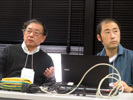
Masato Nakai
and Yoshihiko Tsunoda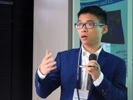
Dinh-Khiet Le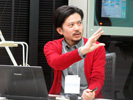
Kentaro Kodama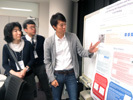
Masayuki Yamada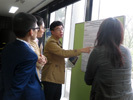
Daichi Ando
Phetnidda OUANKHAMCHAN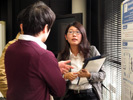
Anna Yoshioka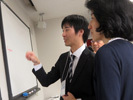
Takahide Etani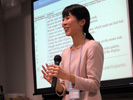
Dr. Eiko Matsuda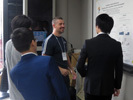

 HOME
HOME 前のページへ
前のページへ